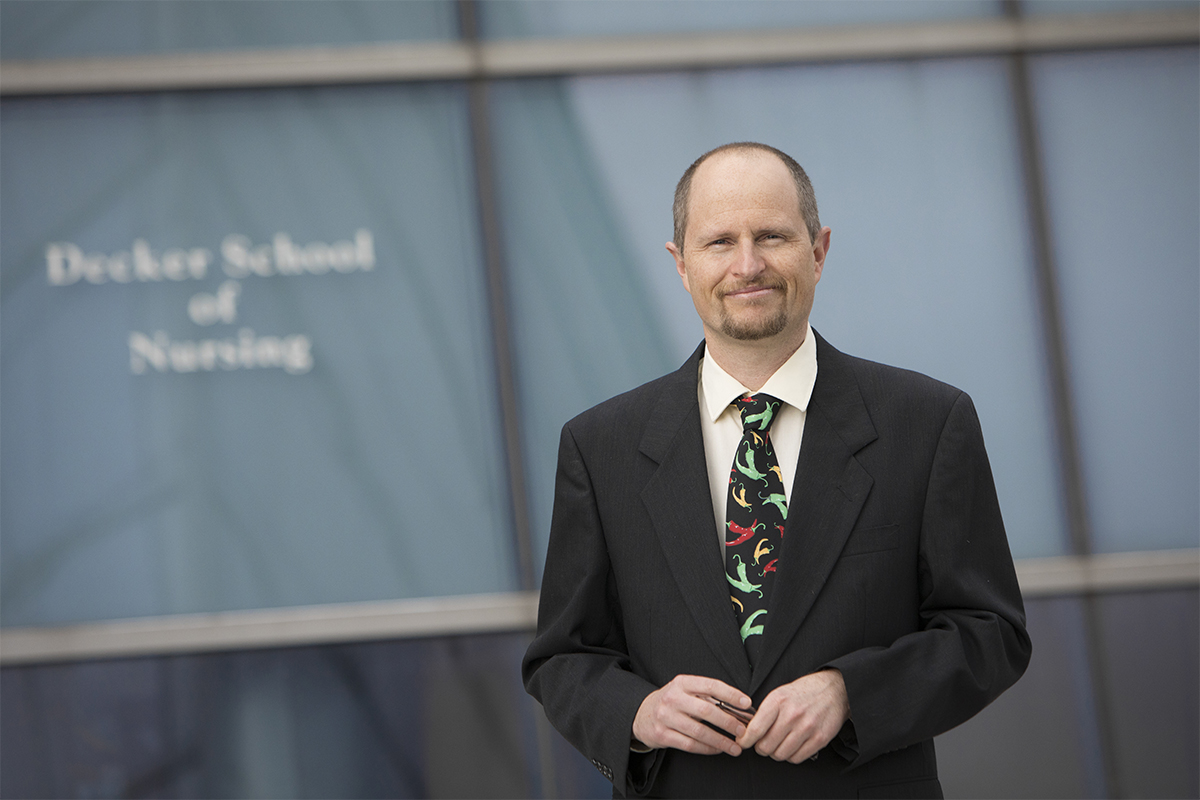Commencement 2017 profile: William Larsen
Doctoral student and nurse practitioner volunteers at free health clinic

Fifteen years into his career as a computer programmer, Decker doctoral student and nurse practitioner William “Bill” Larsen ’10, MS ’15, realized he wanted something else.
“I was looking for a way to reach out and be more connected with people,” he said, “and to feel like what I was doing was having more of a direct impact.”
Larsen said the toughest part of his transition into nursing was starting over from scratch.
“It was difficult; I’d been working full-time, I had young children,” Larsen said. “The biggest thing was that it was a leap into something completely new and I was making a pretty big commitment.”
Some of his skills carried over, most importantly his background in technology. Larsen said nursing is beginning to rely more on information technology and the ability to interact with technology daily. Larsen, who will receive his doctorate of nursing practice this month, said he knew he wanted to reach this level of education because of his fascination with the science behind illness and wellness.
The role of nurse practitioner lends itself to a deeper understanding of medicine and its practice, he said, and he credits the Decker School of Nursing faculty and staff with his success.
“The faculty and staff of Decker have all been very professional,” he said. “They show a deep respect and love for their students and their mission to the community.”
Each week, in addition to his full-time position at IthacaMed, Larsen gives his time at the Ithaca Free Clinic, a part of the Ithaca Health Alliance. The clinic works primarily with the under- and un-insured of Tioga and Tompkins counties. The health staff, all volunteers, takes a different approach and instead focuses on being healthy rather than just treating diseases.
“We have a lot of younger people who are coming in for acute problems,” Larsen said. “We also have older patients with chronic conditions who either don’t have insurance or are under-insured.”
Larsen said the variety of both patients and conditions meant standard models of care wouldn’t be as effective, so in October 2015, Larsen, with assistance from his fellow volunteers, implemented a new way of helping patients.
“Frequently, free clinics operate on a walk-in, acute basis. That’s fine for patients who are coming in for a rash or upper-respiratory infection,” Larsen said. “What we noticed is that so many of our patients are coming in with things such as hypertension; someone will see them and address that and they are sent away without any follow-up. That’s simply not an effective way of managing problems like hypertension or diabetes.”
Larsen said the new model establishes the clinic as a central point for patients to come and reach out for help. The clinic can then help them overcome barriers such as transportation and cost of care.
At first, the largest hurdle was finding time for volunteers to come together and train as well as discuss issues with the new system, Larsen said. To date, the program has been a success — with Larsen pointing to the story of a woman who had many silent heart attacks and felt there was nowhere to go for help.
“We were able to work with her, understand her story and find out what things were concerning to her. We ended up getting her to the point where she was able to see a cardiologist,” he said. “We served as a base where she was able to go out and meet with other physicians and have open-heart surgery. She’s doing very well now.”
In addition to his time volunteering at the clinic, Larsen went on a Decker-sponsored trip to the Dominican Republic in 2014, to help support healthcare efforts within vulnerable populations. The first graduate student to go on the trip, Larsen said it was important in giving Decker students perspective.
“It was an incredible experience to go down with a number of undergraduate nurses to an area that really lacks the kind of infrastructure we’re used to,” he said. “I think it was really important for the students to understand, to some extent, just how well we have it.”
Earlier this year, Larsen was the recipient of the Chancellor’s Award for Student Excellence, given to those who best exemplify integrating academic excellence with other parts of their lives.
“I feel like I’ve gotten too much praise, to be honest,” Larsen said. “It was an incredible honor and I really want to thank the Decker faculty for putting me up for this award.”
Larsen said he is where he wants to be and loves everything he’s doing, including working with a colleague on a cookbook for diabetics that focuses on healthy and cost-effective meals. He said he always looks forward to the next challenge.
“You always want to do more; you’re never 100 percent satisfied and I’m still not satisfied with everything that I’ve done,” he said. “Every day I get up and I’m thinking about new ways to expand what I know and find new ways to help my patients.”
